An autonomic and “off–on–off”-switchable polymer microreactor
Abstract
An originally designed autonomic and “off–on–off”-switchable polymer microreactor is reported. This polymer microreactor was made of nickel nanoparticles and a unique shape-memory polymer consisting of poly(acrylamide) and pendent dodecyl side chains that exhibited switchable domains. This reactor showed weak reactivity at relatively low temperatures due to the low mobility of molecular chains in the switchable domains, which inhibited the access of substrate to the encapsulated nickel nanoparticles (i.e., catalytic ‘off’ status). This reactor also showed weak reactivity at relatively high temperatures in response to the significantly increased hydrophobicity (viz., catalytic ‘off’ status). This reactor only demonstrated significant catalysis at modest temperatures, arising from the relative balance between the mobility of molecular chains and the hydrophobicity in the switchable domains (i.e., catalytic ‘on’ status). In this way, this polymer microreactor demonstrated the autonomic “off–on–off” catalytic ability. This novel design opens up the opportunity to develop smart polymer microreactors for controlled catalytic processes.


 Please wait while we load your content...
Please wait while we load your content...